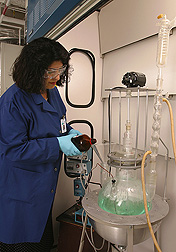This page has been archived and is being provided for reference purposes only. The page is no longer being updated, and therefore, links on the page may be invalid.
|
Read the magazine story to find out more. |
|
|
|
|
With Biobased Additives, ARS Scientists "Just Say No!" to Petroleum
By Marcia WoodSeptember 3, 2009
Powerful machines that have moving parts—your car's engine or the hydraulic pump of a huge earthmover, for instance—almost always require lubricants. Today, most of those lubricants are made of so-called "base oil" that's blended with additives to boost performance.
The U.S. demand for additives, already at nearly 2 billion pounds a year, is expected to increase 2 percent annually for the next five years. That projection might attract new interest in a process, developed several years ago by Agricultural Research Service (ARS) chemist Sevim Z. Erhan and her colleagues, for making additives from plants instead of petroleum. These biobased additives would be suitable for use in formulating greases; engine oils; and hydraulic, transmission and drilling fluids, according to Erhan.
The additives could be made from the predominant fat molecules—triglycerides—in natural oils of familiar crops like soybean, corn or canola, or from lesser-known plants like camelina, crambe or pennycress.
Besides providing a potentially profitable market for growers in the Midwest and elsewhere, the fully biodegradable, new-age additives offer other benefits and, to date, no downside. Since they're fully biodegradable, proper disposal is fast, easy and inexpensive. They can be used with either biobased or conventional lubricants. The additives meet all the standard criteria for a top-notch, antifriction, antiwear additive–namely, impressive viscosity and liquidity, high flashpoint, and stability despite temperature extremes.
In small-scale laboratory tests to evaluate wear and friction, the plant-oil additives performed as well as or better than commercial petroleum-based additives.
Erhan and colleagues did the work while Erhan worked at the agency's National Center for Agricultural Utilization Research in Peoria, Ill. She's now director of the ARS Eastern Regional Research Center in Wyndmoor, Pa.
Erhan and co-investigators Brajendra K. Sharma of Pennsylvania State University-University Park and Atanu Adhvaryu, formerly with the university, received a U.S. patent in 2007 for the eco-friendly process used for making the additives. Their work is highlighted in the September issue of Agricultural Research magazine.
ARS is the principal intramural research agency of the U.S. Department of Agriculture.

